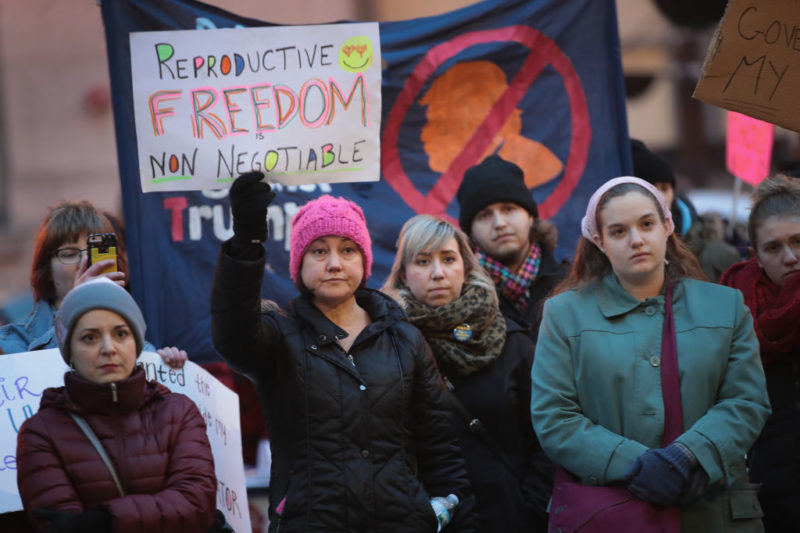‘This Fight Has Existential Stakes’: How a Court Ruling Has Thrown Kansas Abortion Laws Into Flux
The Kansas Supreme Court ruling that abortion is a fundamental right has sent anti-choice organizations and lawmakers scrambling.

Both pro-choice advocates and their opponents in Kansas are determining how best to proceed in the wake of the Kansas Supreme Court’s ruling declaring abortion a fundamental right protected by the state’s constitution.
The ruling could have far-reaching effects on the state’s anti-choice laws, even as some anti-choice activists in Kansas continue to push a “fetal personhood” constitutional amendment that would wipe out any chance to improve access to abortion care in the state.
In April, the high court struck down a law banning the most common form of second-trimester abortion care, finding that the Kansas Constitution protects the right to personal autonomy and that includes the choice to have an abortion.
The court’s decision means abortion restrictions must be evaluated more stringently than the undue burden standard used at the federal level. And it means the right to an abortion in Kansas is protected even if Roe v. Wade is overturned by conservative justices on the U.S. Supreme Court.
“The ruling that abortion is a fundamental right in Kansas protects abortion even more strongly [than] Roe v. Wade, which is promising, especially in an era when it looks like the [U.S.] Supreme Court is set to undermine or overturn that ruling,” said Elise Higgins, vice president of the Kansas Abortion Fund, which provides financial and logistical support to Kansans seeking abortion care.
The ruling has prompted abortion opponents to call for amending the state constitution—though they are divided on the best strategy. Some groups are pushing for a so-called personhood amendment that would grant constitutional rights to fertilized eggs, while others want to amend the state constitution to specify it does not include the right to abortion.
“What the personhood amendment says is that we recognize the humanity of the unborn child from their earliest biological beginning,” Bruce Garren, chairman of Personhood Kansas, said at a legislative committee hearing in October. The state’s leading anti-choice group, Kansans For Life, has pushed back against a “personhood” amendment in support of a more incremental approach, the Associated Press reported.
“We’re interested in making a difference, and not just a statement,” Jeanne Gawdun, director of government relations with Kansans for Life, said at the hearing.
Anti-choice groups are concerned the Kansas Supreme Court’s ruling will undo years of anti-choice laws in place. But because Kansas courts have not yet had the opportunity to review current laws under the strict scrutiny standard the ruling’s implications are not yet clear, said Rachel Sweet, regional director of public policy and organizing at Planned Parenthood Great Plains.
“Our opposition is saying is that this is going to put every abortion law in jeopardy, and frankly we just don’t know yet,” Sweet told Rewire.News. “It will take years to figure out what the actual, real impacts of this decision are.”
While no one can say for certain how existing anti-choice laws will be affected, Higgins said the ruling could shape the outcome of a case challenging targeted regulations of abortion providers, or TRAP laws. SB 36, passed by Kansas Republican legislators in 2011, imposed onerous licensing requirements on abortion facilities, such as specific dimensions of rooms and hallways. TRAP laws are designed to make compliance so difficult that many abortion clinics shut down.
The law was swiftly challenged and enjoined, so it has never been in effect in Kansas. But because its regulations would shut down at least one abortion facility in Kansas, it likely won’t hold up under the strict scrutiny standard set by the Kansas Supreme Court, Higgins said. As of 2017, Kansas had four facilities providing abortion services, according to the Guttmacher Institute.
“Because the law is explicitly intended to shut down an abortion provider, it negatively affects abortion access in a way that would be contrary to the ruling that everyone has the right to bodily autonomy,” Higgins told Rewire.News.
The strict scrutiny standard seems to offer a path to undo some of the state’s abortion restrictions, which include state-mandated counseling intended to dissuade patients from getting an abortion; a forced 24-hour waiting period; parental consent for minors; and a prohibition on private insurance companies covering abortion outside life endangerment circumstances, unless an individual spends more money on an optional rider. But pro-choice advocates say they are are more concerned with stopping a constitutional amendment than overturning current laws.
“If a constitutional amendment passes saying there’s no right to abortion, then the minute Roe v. Wade is undermined or overturned, people in Kansas will lose their right to abortion, period,” Higgins said. “This fight has existential stakes.”
Republicans introduced a “personhood” amendment in January, but the bill did not advance out of committee. A similar measure failed to pass in 2017. So-called personhood measures have been rejected by voters in several states, including Colorado, where a “personhood” ballot initiative has failed multiple times.
Amending the state constitution requires a two-thirds majority in both the state house and senate before the issue can go on the ballot for a statewide vote. Though Kansas has a Democratic governor, the GOP still holds large majorities in both chambers, with 84 of 125 seats in the house and 28 of 40 seats in the state senate.
In May, Republican lawmakers failed by a single vote to override Gov. Laura Kelly’s (D) veto of a bill requiring doctors tell patients that medication abortion can be reversed, a claim that has not been verified by the medical and scientific communities. The same two-thirds majority needed to sustain a veto would be needed to approve a constitutional amendment.
“It’s real close,” Sweet said. “We’ve done it. I think we can do it again, but it’s not easy.”
